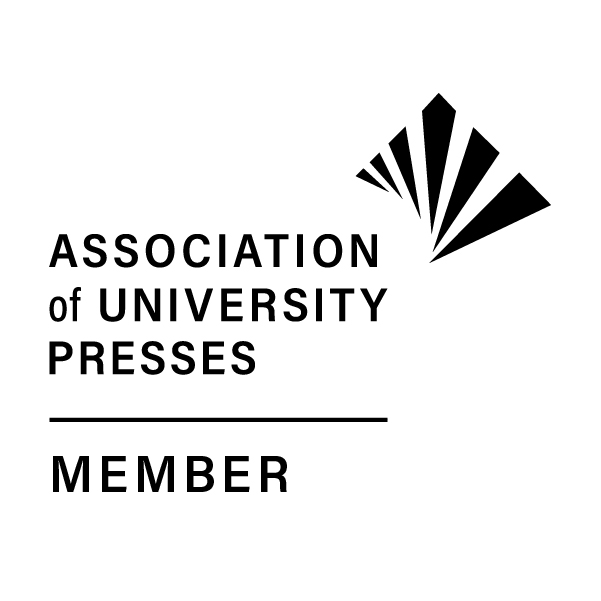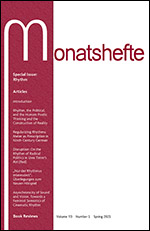|


|

Subscribe
Read the Journal Online
Submission Guidelines
Editorial Board
Receive Email Updates
Advertise in Monatshefte
Indexes/Abstracts
Current Issue TOC
Back Issues TOC
Monatshefte 2022 Subscription Rates
Institutions:
print & online $271
online only $233
Individuals:
print & online $103
online only $86
Non U.S. Postage (no postage charges for online-only subscriptions)
Airmail: add $40/yr.
Canadian Subscribers: add 5% GST. |
Monatshefte
Volume 112, Number 2, Summer 2020
Table of Contents
ARTICLES
Fabian Goppelsröder
Media Aesthetics and Small Form: Calendar Tale, Fait Divers, and the Digital Age
How does a tweet become twitterature? What makes small forms literary? In times of Twitter and Facebook, text messages and email the question of the poetic potential of short prose texts arises in new, emphatic ways. But does shortness suffice to explain their particular aesthetics? And how short is ‘short’? Instead of focusing on the number of characters alone, this essay understands small forms as short texts whose poetics unfolds from the texts’ subversive play with their medial embedding. Two fundamentally different analog authors, Johann Peter Hebel (1760–1824) and Félix Fénéon (1861–1944), serve as a historical background against which a new view on the literary possibilities of small forms in the age of digitization opens up. In the conscious, playful handling of media routines and habits, I argue, they are able to attain an aesthetic power that goes beyond a witty punch line. (FG)
Andrea Weatherman Kikkert
Revelation in Reproduction: Walter Benjamin’s Prophecy and Steve Reich’s Process
This article examines Steve Reich’s reflections on his early works in the context of Walter Benjamin’s thesis in “The Work of Art in the Age of its Technical Reproducibility.” While Reich shows a similar attitude to Benjamin’s toward changes in human perception, Benjamin’s notion of auratic demise is challenged by Reich’s understanding of the role of technology in music and the effects of music as a gradual process, which asserts that attributes such as impersonality support artistic autonomy rather than precluding it. According to Benjamin, aura collapses due to changes in audience reception during the age of technical reproducibility, yet Reich drew inspiration from mechanical processes in order to reclaim meaningful audience participation in music. This comparative study provides the opportunity to both consider Benjamin’s ideas anew and deepen our understanding of the minimalist musician’s contributions to contemporary art. (AWK)
Clara Ervedosa
“The Perpetrator is a Southerner”: “Südländer” as Racial Profiling in German Police Reports
This article represents the first study of the German category “Südländer,” or “Southerner.” It demonstrates that the police use this term as a form of racial profiling in police reports in order to characterize specific perpetrators’ phenotype. Typically, this implies ‘olive’ skin color, dark hair, and dark eyes. Ostensibly, the term is used to enable citizens to collaborate with the police in the process of identifying and apprehending a criminal. This inductive and digitally supported study offers an example of the persistence of racialized thought in German society after WWII. It reveals how the police, as one of the most significant state institutions in Germany, contribute to this process of racialization by frequently employing the term “Südländer.” At the same time, the article illustrates the degree to which older racializing systems of knowledge that used constructs such as the “Mediterranean Race” and social configurations such as the “white/brown” color-line still resonate in this ostensibly post-racial terminology. (CE)
Benedikt Wolf
Cruising, Travelling, Marching toward the Center: The Spatial Parameters of Male Homosexuality in Felix Rexhausen’s Novels of the 1960s
Starting from discussions about the role of space in the history of male homosexuality and in LGBT identity formation, this article investigates patterns of space and movement in three gay-themed novels that Felix Rexhausen, a pioneer of gay literature and journalism in West Germany, wrote and/or published in the 1960s. The readings of the novels show that the centripetal movement from the province to the metropolis that might appear fundamental to what Jack Halberstam has labeled “metronormativity” is neither dominant nor normative in these narratives. Rather, Rexhausen’s novels intertwine different models of spatiality in a complex and artful manner that can be fully grasped only by analyzing the relationship of narrative space and the spatial extension of the text. (BW)
Hans-Joachim Hahn
PEGIDA auf der Bühne. Volker Löschs Das Blaue Wunder in Dresden
Das Blaue Wunder, first performed in January 2019, responds to right-wing populism in Germany. While owing much to the political theatre of Erwin Piscator and Sergei Eisenstein, the play avoids agitprop, instead involving the audience in a discussion between right-wing populism and democratic values, with statements from AfD propaganda opposed by the voice of democratic counter-movements, represented by rave musicians and civic protest groups. The play is a workshop production by the artistic director Volker Lösch and two young authors, the stage dominated by a huge steel construction of a ship, occupied by right-wing sympathizers, while their opponents form a chorus in the foreground. This article discusses the problem of presenting the right-wing in a realistic way while maintaining a satirical element. The figure of the “deutsche Michel” represents the politically naïve German, ready to accept any compromise. The play’s missing fifth act propels the action into the future, where the audience will have to choose between the opposing solutions, its epilogue inspiring hope in the political activism of Dresden’s young generation. (HH, in German)
Katherine Kerschen
“Was willst Du denn eigentlich, Clementine?”: Subjectivity in Fanny Lewald’s Clementine
This article aims to move the scholarship concerning Clementine beyond a narrow interpretation focused on the extratextual significance of this work as it relates to Lewald’s biography as an activist for women’s emancipation. It approaches the novel with a focus on its formal elements, employing critical frameworks from Bakhtin and Butler to examine how Clementine is constructed as a subject. A tension between narrativization (a stable identity) and the unfinalizability inherent in the development of the self pervades the novel, as shown in the contradictions between Clementine’s language and actions. This never-resolved tension is reflected at the structural level in the heterogeneous textual genres contained in Clementine, which allows for a Butlerian reading of identity development through performativity. Ultimately, I show that this largely overlooked work exemplifies many of the features of the literary that have been prized in the canonical—and principally male-authored—texts of the nineteenth century. (KK)
REVIEW ARTICLE
Stephen Brockmann
Is There Anything at Stake? Recent Studies of East German Literature and Culture
(Eisman, April A., Bernhard Heisig and the Fight for Modern Art in East Germany, 2018.—Blankenship, Robert, Suicide in East German Literature: Fiction, Rhetoric, and the Self-Destruction of Literary Heritage, 2017.—Swope, Curtis, Building Socialism: Architecture and Urbanism in East German Literature, 1955–1973, 2018.—Frackman, Kyle and Faye Stewart, eds., Gender and Sexuality in East German Film: Intimacy and Alienation, 2018.—Allan, Seán, Screening Art: Modernist Aesthetics and the Socialist Imaginary in East German Cinema, 2019.—Waltz, William, Of Writers and Workers: The Movement of Writing Workers in East Germany, 2018.—Bednarz, Dan, East German Intellectuals and the Unification of Germany: An Ethnographic View, 2017.)
BOOK REVIEWS
Andree, Martin, Placebo-Effekte. Heilende Zeichen, toxische Texte, ansteckende Informationen (Jennifer Marston William)
Bianca, Stefano und Bruno Pieger, Hrsg., Rudolf Fahrner. Ein Leben und Werk im Zeichen von Stefan George (Rolf J. Goebel)
Bowden, Sarah and Annette Volfing, eds., Punishment and Penitential Practices in Medieval German Writing (Anne Simon)
Buchholz, Paul, Private Anarchy: Impossible Community and the Outsider’s Monologue in German Experimental Fiction (Eva Erber)
Classen, Albrecht, ed., Bodily and Spiritual Hygiene in Medieval and Early Modern Literature: Explorations of Textual Presentations of Filth and Water (Jolanda Vanderwal Taylor)
Dürbeck, Gabriele, Christine Kanz und Ralf Zschachlitz, Hrsg., Ökologischer Wandel in der deutschsprachigen Literatur des 20. und 21. Jahrhunderts. Neue Perspektiven und Ansätze (Helga G. Braunbeck)
Goetschel, Willi, Heine and Critical Theory (Robert C. Holub)
Görner, Rüdiger, Schreibrhythmen. Musikliterarische Fragestellungen (Hannah V. Eldridge)
Huber-Rebenich, Gerlinde, Christian Rohr und Michael Stolz, Hrsg., Wasser in der mittelalterlichen Kultur / Water in Medieval Culture. Gebrauch – Wahrnehmung – Symbolik / Uses, Perceptions, and Symbolism (Jolanda Vanderwal Taylor)
Lande, Joel B., Persistence of Folly: On the Origins of German Dramatic Literature (Giovanna Pinna)
Miller, Matthew D., The German Epic in the Cold War: Peter Weiss, Uwe Johnson, and Alexander Kluge (Martin Brady)
Schmidt, Jana V., Arendt und die Folgen (Adam Y. Stern)
Singh, Sikander, Hrsg., 1968. Literatur und Revolution (Susanne Rinner)
Weidler, Markus, Heidegger’s Style: On Philosophical Anthropology and Aesthetics (Ingo Farin)
Wilson, W. Daniel, Der Faustische Pakt. Goethe und die Goethe-Gesellschaft im Dritten Reich (Christiane Steckenbiller)
BOOKS RECEIVED
|

